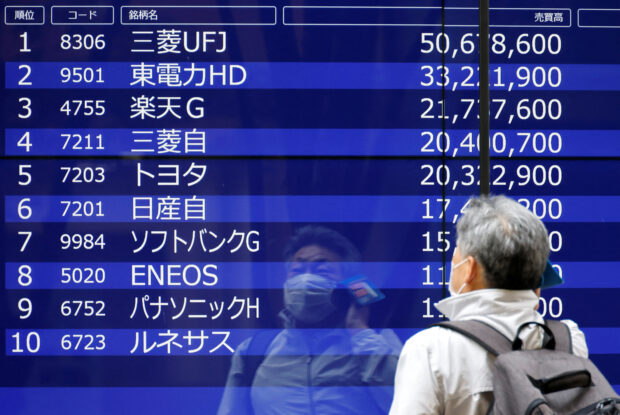Asia shares fall as China’s modest rate cut disappoints

A man is reflected on an electric monitor displaying a stock quotation board outside a bank in Tokyo, Japan. REUTERS/Issei Kato/File photo
HONG KONG – Stocks in Asia fell on Tuesday as investors worried China’s latest rate cut would not be enough to boost confidence in the weakening economy and hoped for a bigger stimulus package from Beijing.
China, in a highly anticipated move, cut its benchmark loan prime rates (LPR) for the first time in 10 months on Tuesday, although the 10-basis point reduction in the five-year LPR was smaller than many had expected.
MSCI’s broadest index of Asia-Pacific shares outside Japan fell 0.72 percent. China’s benchmark CSI was mostly flat although Hong Kong shares and mainland property stocks skidded after the rate cut disappointment.
E-mini futures for the S&P 500 fell 0.33 percent. U.S. markets were closed for a public holiday on Monday.
“I don’t think they (the LPR cuts) are going to move the needle at all,” said Redmond Wong, Greater China market strategist at Saxo Markets. He said a 15 basis-point cut would have sent a “stronger message” that could boost sentiment in China’s property sector.
“The (Chinese) economy is in precarious state which is tricky to get out of,” macroeconomist Aidan Yao, formerly with AXA Investment, told the Reuters Global Markets Forum after the China rate cut.
He said despite the accommodative policy settings, liquidity remains stuck in bank deposits and has not found its way into the economy with the demise of China’s property market.
China’s real estate index extended morning loss to fall 1.41 percent.
The rate cuts are the latest in a string of moves by Beijing to shore up a slowing recovery in the world’s second-largest economy amid looming deflation risks, property market woes and high youth unemployment.
The People’s Bank of China lowered the medium-term lending facility rate on Thursday last week. The market was speculating on what China could do next to revive the recovery but was disappointed by a lack of concrete measures from a cabinet meeting on Friday.
China seen cutting key lending benchmarks as economy slows
“We probably will need to wait for China’s Politburo meeting, headed by President Xi early in July, for any concrete announcement on a new round of stimulus,” National Australia Bank Senior FX Strategist Rodrigo Catril said in a client note.
The delay in further stimulus measures weighed on sentiment, with Citi the latest in a handful of big banks to lower its growth forecasts for the Chinese economy on Tuesday.
Meanwhile, China and the United States failed to produce any major breakthrough during U.S. Secretary of State Antony Blinken’s visit to Beijing, but both sides agreed to stabilize relations to avoid veering into conflict.
Xi, Blinken agree to stabilize US-China relations in Beijing talks
“The meeting helped improve sentiment, but the market also understands that there’s strategic competition between the U.S. and China,” Saxo’s Wong said.
Hong Kong stocks fell 1.47 percent with its tech gauge dropping 2.41 percent on disappointment about the size of China’s rate cuts and continued worries about Sino-U.S. tensions.
Japan’s Nikkei fell 0.24 percent on Tuesday.
Australian shares bucked the trend, hitting a seven-week peak, with commodity stocks leading the charge. A central banker on Tuesday hinted there was room for policy adjustment from the current path of aggressive rate hikes.
The benchmark U.S. 10-year Treasury yield rose 3.1 basis points.
U.S. crude fell 1.28 percent to $70.86 per barrel and Brent was at $75.90, down 0.25 percent on the day.
The U.S. dollar index rose 0.117 percent, with the euro down 0.09 percent to $1.0912.
Spot gold dropped 0.12 percent to $1,947.7 an ounce.